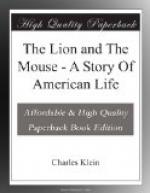“Do unto others as you would have others do unto you.” This simple and fundamental axiom Jefferson Ryder had adopted early in life, and it had become his religion—the only one, in fact, that he had. He was never pious like his father, a fact much regretted by his mother, who could see nothing but eternal damnation in store for her son because he never went to church and professed no orthodox creed. She knew him to be a good lad, but to her simple mind a conduct of life based merely on a system of moral philosophy was the worst kind of paganism. There could, she argued, be no religion, and assuredly no salvation, outside the dogmatic teachings of the Church. But otherwise Jefferson was a model son and, with the exception of this bad habit of thinking for himself on religious matters, really gave her no anxiety. When Jefferson left college, his father took him into the Empire Trading Company with the idea of his eventually succeeding him as head of the concern, but the different views held by father and son on almost every subject soon led to stormy scenes that made the continuation of the arrangement impossible. Senator Roberts was well aware of these unfortunate independent tendencies in John Ryder’s son, and while he devoutly desired the consummation of Jefferson’s union with his daughter, he quite realized that the young man was a nut which was going to be exceedingly hard to crack.
“Hello, senator, you’re always on time!”
Disturbed in his reflections, Senator Roberts looked up and saw the extended hand of a red-faced, corpulent man, one of the directors. He was no favourite with the senator, but the latter was too keen a man of the world to make enemies uselessly, so he condescended to place two fingers in the outstretched fat palm.
“How are you, Mr. Grimsby? Well, what are we going to do about this injunction? The case has gone against us. I knew Judge Rossmore’s decision would be for the other side. Public opinion is aroused. The press—”
Mr. Grimsby’s red face grew more apoplectic as he blurted out:
“Public opinion and the press be d—–d. Who cares for public opinion? What is public opinion, anyhow? This road can manage its own affairs or it can’t. If it can’t I for one quit railroading. The press! Pshaw! It’s all graft, I tell you. It’s nothing but a strike! I never knew one of these virtuous outbursts that wasn’t. First the newspapers bark ferociously to advertise themselves; then they crawl round and whine like a cur. And it usually costs something to fix matters.”




